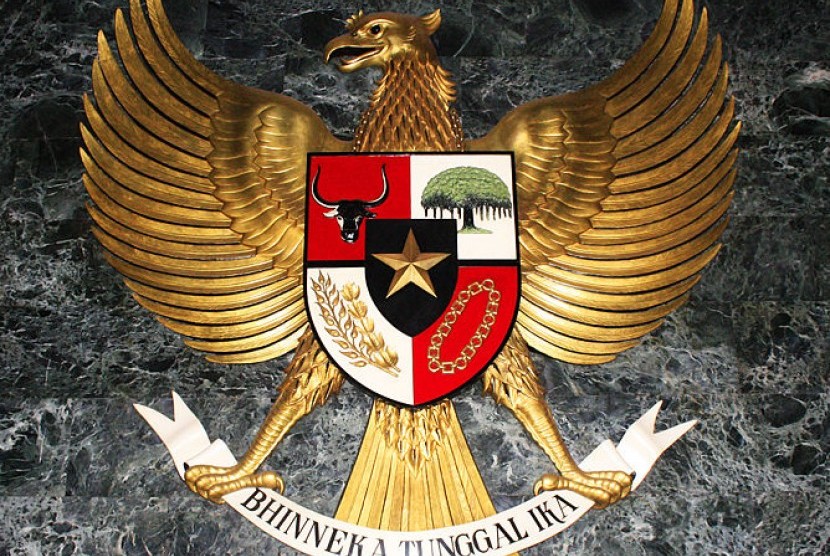By: BR. Rajo Nagari *)
REPUBLIKA.CO.ID, Hizbut Tahrir Indonesia (HTI) dissolution is currently being conducted legal process at the Central either through Court or Perppu. However, HTI is still conducting activities before there is a permanent legal decision by conducting activities in private. HTI was dissolved not because of its Islamic Shari'a, but HTI's political attitude which was not in accordance with Pancasila Ideology.
The government has decided to dissolve the HTI because allegedly it is against the Pancasila and the 1945 Constitution which is feared to destroy the Unitary Republic of Indonesia (NKRI); Official disbursement of HTI will have an impact so that anticipation of potential horizontal conflicts is required.
Indonesia consists of various tribes united by Pancasila. Therefore, Arab culture is not suitable to be applied in Indonesia which already has its own culture and if applied can lead to destruction. The fundamental issues of the Indonesian nation are: cultural resilience, human rights meanings, quality of politicians, law enforcement, policy of opinion and expression, economic justice, and poor literacy.
Basically, the accused of spreading the teachings of religion is allowed as long as it does not touch the joints of the nation and state; Conveying the teachings of religion is allowed as long as it does not disturb the unity of NKRI because it will face tremendous resistance when touching the joints of nation and state.
Radicalism consists of two principles: the passive radical (thinking / insight) and the active radicals (acts of violence / revolution). The development of radicalism must be prevented, deterred and handled. Radical understanding must be done holistically, comprehensively and synergy from all stakeholders in Indonesia.
Pancasila as Common Ground
Since the beginning of the founding of this nation, Pancasila has been believed to be a common ground for the foundations and ideals of the state, to be a meeting point and to bind all the subjective diversity of some national groups who want this country based on the ideology of religion and ideology and the spirit of regionalism.
Proven until this moment, Pancasila still serves as the foundation of the unity of the nation and state of the unity of the republic of Indonesia. Pancasila remains the only national ideology, as the nation's life view, as a glue and unifier, and as a fundamental insight of this beloved nation in achieving its national ideal.
By it, we all certainly hope and strive to keep Pancasila so that all ideas, concepts, principles and values contained in Pancasila can live and grow.
In an effort to strengthen national resilience, we need to examine the negative influences in the transitional period of democracy in every sphere of national life covering the fields of ideology, politics, law, social culture and security.
The field of Ideology, related to the resilience of Pancasila ideology then at this time it is worth to watch and anticipate the phenomenon of ideology and radical ideology spread by certain groups or networks who want to develop such radical organization in the earth of Indonesia. If it is not wary can destroy the integrity of the nation and state.
Politics, through reforms there has been a significant shift in political dynamics in Indonesia, the original centralist authoritarian order of political change has become and yet, along with that on the other side there are various forms of disorientation and dislocation in many societies, such as the socio-political disintegration caused by the euphoria of freedom The exaggeration, the disappearance of social patience (social temper) in the face of the reality of political life. Therefore, political education is needed continuously by all stakeholders, mainly by the government and political parties as a pillar of democracy, so that an effective political communication between the government and the society in general and political parties in particular can be realized.
Economic, Various steps and policies have been taken by the Government for economic problems, in order to realize the Indonesian nation that has high competitiveness. The Indonesian nation has social capital (human capital) that is human resources as a powerful force that can be used as capital in various business fields.
Field of Law, the state of Indonesia is a state based on law, and not on power, meaning that the rule of law should be put forward. But in reality that happens is the harassment in the field of law, so the implementation of the rule of law has not been fully implemented properly. Social and
Cultural Affairs, globalization has had implications for the various dimensions of Indonesian society, especially the cultural aspect, where foreign thought is appropriate to be applied in Indonesia. Besides, the completion of various problems faced by the nation raises the perception of the society (social / public distrust), this condition encourages various circles of society to seek their own identity and not the few that contradict the true identity of Indonesia, such as narcotics abuse, Pornography, gambling and so on.
Security, progress in information and communication technology becomes an opportunity for global network to conduct crime cross country, even this global network is also exploited international terrorist actors to launch its operations for the interest of certain groups, therefore the need to improve the function of the Community Regional Intelligence, the role of the Community Awareness Forum (FKDM), the Forum for Harmony (FKUB), the Assembly Forum (FPK) so that Indonesia does not become a target of international crime and terrorism.
In an effort to achieve the ideals through the dedication to the nation and state, presumably we should all remain consistent and consistently put forward Pancasila as the ideology of the nation and the Unitary State of the Republic of Indonesia.
*) Senior researcher at the Jakarta Institute for Political and Democratic Analysis (LAPD). Living in Bukittinggi, West Sumatra.


